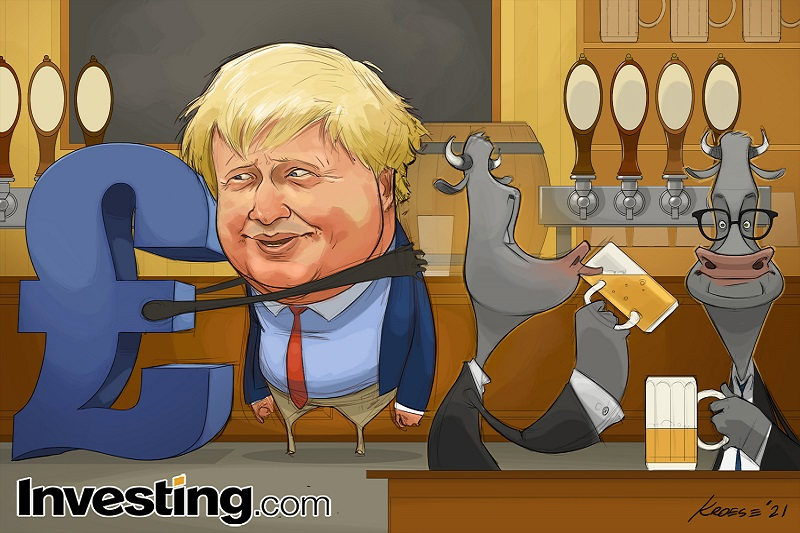Weekly Comic: Cheers! It’s Springtime for Sterling By Investing.com

By Geoffrey Smith
Investing.com — The rain may be incessant but in every other sense, the clouds over the U.K. economy appear to be finally lifting.
Lockdown restrictions on pubs, theatres, museums, concert halls and gyms were all largely lifted on Monday, while the government also relaxed limits on social gatherings. The move will allow a broad swath of the British service sector.- which accounts for 71% of gross domestic product – to operate in near to normal conditions again. Outward-bound tourism is now allowed, although the list of countries that can be visited without cumbersome quarantine and testing requirements is short. Official government guidance now even allows people to hug their long-unvisited relatives again, albeit with ‘caution’. And if that wasn’t enough to put a smile on people’s faces, the nation’s biggest soccer match took place on Saturday at Wembley Stadium in front of 20,000 spectators (with a gratifying win for the underdogs, Leicester City).
The country has recovered impressively from an initially shambolic reaction to the Covid-19 disaster, and is now reaping the rewards. Britain has vaccinated more of its population, proportionally, than any other major economy, with 70% of the adult population having received at least one shot of vaccine against the disease and 39% receiving two shots, making them effectively immune.
The number of new Covid-19 cases has fallen to around 2,000 a day, while the number of deaths on Monday fell to a mere seven, the lowest it’s been since August.
That progress is being reflected in official data: employment rose for the fifth month in a row in April, according to data released on Tuesday, and the average level of employment over the last three months was higher, in year-on-year terms, for the first time in eight months, thanks to rapid rehiring by the service sector. The Bank of England at its latest meeting raised its forecasts for growth this year to 7.5% from 5% initially, and became the second G7 central bank (after Canada) to dial down the pace of its bond purchases.. (It will still inject as much stimulus as it originally planned, only more slowly.)
All this has lifted sterling above $1.42, to within a couple of percent of where it was on the eve of the Brexit referendum in 2016 – even if it is still down by over 10% against the euro in that timeframe. The FTSE 250, which tracks midcap companies with a more domestic focus rather than the globalized giants in the FTSE 100, hit a record high last week. Ten-year government bond yields, while rising to post-Covid highs, are not signaling either an inflation scare or any kind of generalized loss of confidence in the pound that might be expected in view of the U.K.’s twin deficits.
The latest rally in sterling has also been helped by this year’s round of local elections, which left the pro-independence Scottish National Party without a clear mandate to call another referendum on independence, as its leadership wants. A U.K. breakup remains a story for another day, although it hasn’t gone away..
Admittedly, there is at least one fly in the ointment. A new and more highly transmissible variant of Covid-19, first detected in India, is now spreading within the U.K. and is set to become the dominant strain in the country within weeks. Prime Minister Boris Johnson conspicuously passed up the opportunity on Monday to confirm the timetable for lifting remaining restrictions on social distancing. The current government’s capacity for disaster, richly illustrated by its handling of the pandemic last year, doesn’t allow for any complacency on that front.
Nor are the economic clouds of Brexit entirely banished. While the initial disruption of cross-border trade earlier this year has eased, the issue continues to poison relations with the country’s neighbors. In the last month alone, London has sent warships to scare French fishing boats away from fishing grounds off the Channel Islands, and enraged both Dublin and Brussels with its efforts to wriggle out of its promises with regard to Northern Ireland.
On the plus side, however, fears that the emigration of EU citizens due to residency rights would lead immediately to labor shortages appear not to have materialized: official data show the number of EU citizens who have applied for ‘settled’ status – just under 5 million – is more than the U.K. government ever acknowledged as living in the country before Brexit.
Overall, despite the seemingly deliberate incompetence of its leaders at times over the last 15 months, there are worse places to be than post-Covid Brexit Britain. Now, if only it would stop raining…

